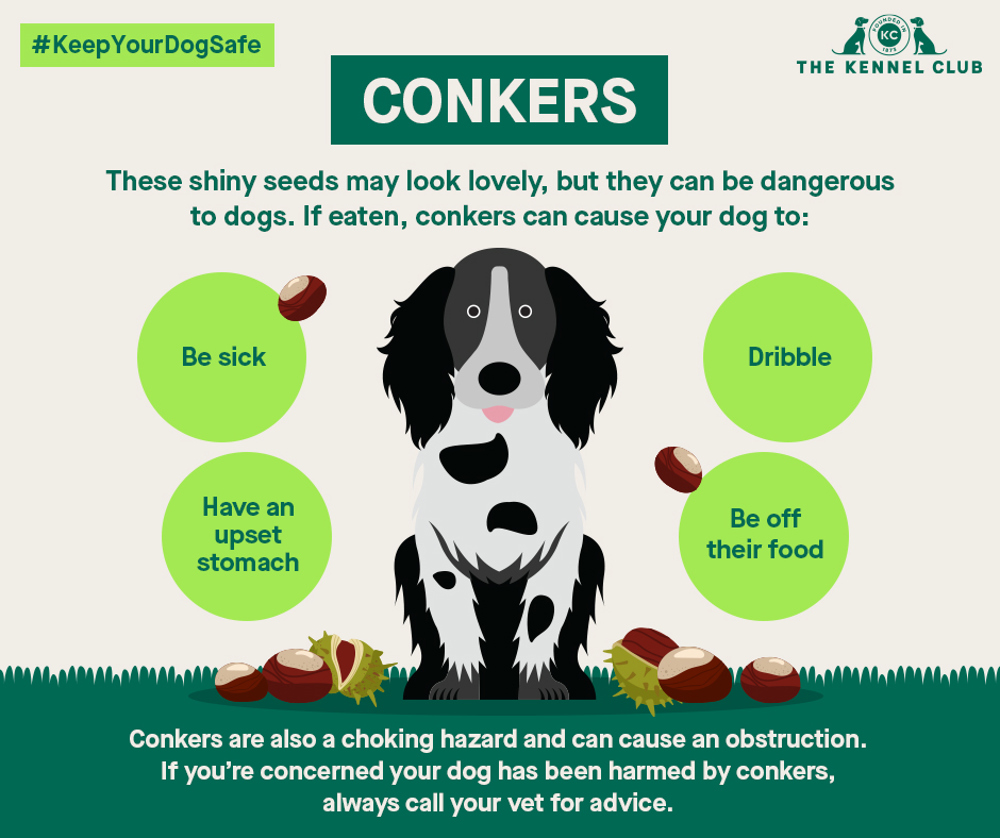
On crisp autumn walks your dog may come across conkers that have fallen from a horse chestnut tree, but are these shiny seeds poisonous or harmful to dogs, what happens if your dog eats one and when should you contact your vet for advice?
What is a conker?
A conker is a shiny, round, red-brown seed from a horse chestnut tree (Aesculus hippocastanum). These trees are usually seen in parks, gardens and along the side of streets in the UK. Conkers are often found on the ground in autumn after dropping from the tree encased in a green or brown spiky fruit.
Are conkers poisonous to dogs?
Yes. Conkers contain a toxin called aesculin, which can cause a dog to be sick or may upset their stomach. If enough is eaten it can also produce more serious effects, and in rare cases can be deadly.
How poisonous are conkers?
Conkers taste quite bitter, so it’s unlikely that most dogs will eat enough to make them very ill. Eating small amounts may give your dog an upset stomach, but larger amounts could make your dog quite unwell. Very serious effects can occur, but they are rare.
How many conkers does a dog need to eat to make them ill?
The amount of toxin in each conker is different, so it’s impossible to know the amount of conkers that your dog would need to eat to make them unwell. A conker’s toxicity will vary from tree to tree and year to year and is dependent on a number of different factors. How your dog is affected by this toxin will also depend on their size, how much they’ve eaten, when they last ate, how much they chew up the conker and if they have any other health issues.
What happens if my dog chews a conker?
After eating a conker, your dog may start to become unwell between one and six hours later. In rare circumstances these effects can be delayed by a few days.
Symptoms include:
Symptoms include:
- Being sick – may contain blood
- An upset stomach
- Dribbling
- Stomach pain
- Being thirsty
- Not wanting to eat their food
- Being restless
- Not walking in a straight line
- Shaking or tremors
- Not being able to move
What other parts of the horse chestnut tree are poisonous to dogs?
All parts of the horse chestnut tree are poisonous and could make your dog ill. The toxin is found in the seeds (conkers), leaves, bark and flowers.
How do I stop my dog eating conkers?
If your dog is prone to eating conkers, then keep them on a lead when going for autumn walks (especially in areas where you know there are conker trees). When walking near ‘conker trees’, bring along a ball or a chew toy to help keep their mouths occupied.
When should I contact my vet?
If your dog has eaten conkers, then you should contact your vet for advice. If you’re unsure whether your dog has eaten them, but they’re showing some of the common signs, then you should speak to your vet. Never try to make your dog sick as this can be dangerous and may cause other problems.
Think your dog may be affected?
If you're worried about your dog's health, always contact your vet immediately!
We are not a veterinary organisation and so we can't give veterinary advice, but if you're worried about any of the issues raised in this article, please contact your local vet practice for further information
Find a vet near you
If you're looking for a vet practice near you, why not visit the Royal College of Veterinary Surgeons' Find a vet page.
